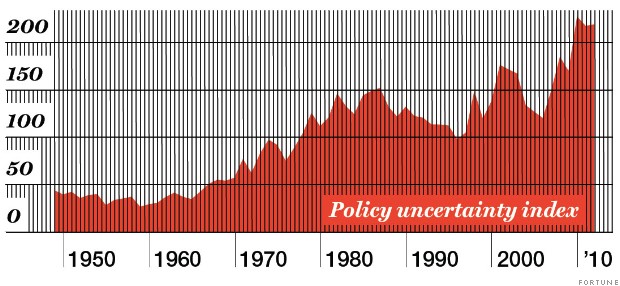Many conservatives have lamented the impact of President Obama’s policies in increasing harmful economic uncertainty. Fortune magazine columnist Geoff Colvin explains in the latest issue that the problem extends far beyond the actions of the 44th president.
Don’t accuse CEOs of whining when they complain that they are hamstrung by Washington’s failure to agree on long-term economic policy. New research shows that policy uncertainty really is higher than ever before — and is damaging the economy.
But don’t accuse President Obama of sparking today’s policy mayhem. It’s true that he has done his part. The administration’s frantic improvising on the Affordable Care Act has spawned chaos in the largest sector of the world’s largest economy. And of the nearly 400 new rules that the Dodd-Frank law requires the administration to write for reorganizing the world’s largest financial sector, only half have been finalized, and the administration has missed about half of its legally mandated deadlines. But in fact economic policy uncertainty has been rising steadily for 50 years, and a new analysis suggests the trend is unlikely to change course. …
… When a trend is so striking, the obvious question is why. In their newest work, the researchers — Scott R. Baker, Nicholas Bloom, and Jonathan Rodden of Stanford, Brandice Canes-Wrone of Princeton, and Steven J. Davis of the University of Chicago — suggest two explanations.
The first is government’s expanding role in the economy. In the years since policy uncertainty began rising in the mid-’60s, the government’s share of GDP has grown from about 27% to 35%. The Code of Federal Regulations has ballooned from 38,000 pages in 1963 to some 154,000 pages in 2012. The tax code is eight times longer than War and Peace. Economic policy now consists of millions of changing, interacting, multiplying, moving parts. No wonder it’s getting more uncertain. The other major factor is political polarization. As it increases, say the researchers, so does the potential for “more extreme policies, less policy stability, and less capacity of policymakers to address pressing problems.” So, for example, when a landmark program like the Affordable Care Act is enacted with no Republican votes, consumers and businesspeople know that a change of control in Washington could dismantle the whole apparatus. That’s major uncertainty.



